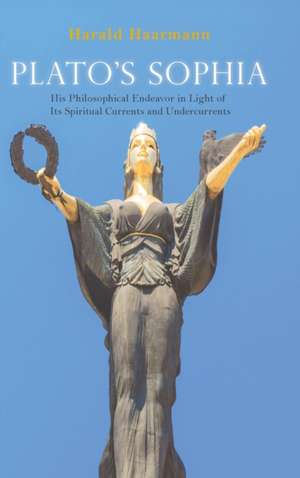Plato's Sophia
Autor Harald Haarmannen Limba Engleză Hardback – 5 dec 2019
When we maintain this modern separation of the philosophical from the spiritual and neglect the spiritual currents, our comprehension of Plato's intentions as manifested in his philosophical discourse remains greatly obscured. This study aims at achieving a balance. In Plato's "love for wisdom" (philo-sophia), we may discern the soundings of an intellectual heritage that dates to pre-Greek times, that is to the era of Old Europe (the Danube civilization, respectively), where the wholeness of life was practised for more than 3000 years. In light of the strands of this heritage that left their mark in Plato's work, it is not surprising to learn that, in Indo-European languages, no cognate expression corresponding to the Greek stem soph- can be found. As modern insights from historical linguistics tell us, the isolation of this expression (Sophia) in Greek and its sound structure point to a pre-Greek origin of the term. In other words, the early Greeks embraced an older tradition of reasoning which they considered useful.
Plato's Sophiawill be of vital interest for philosophers, cultural scientists, and students of Greek antiquity, as well as for those who take interest in the world of Old Europe and its afterglow.
Preț: 626.87 lei
Preț vechi: 681.39 lei
-8% Nou
Puncte Express: 940
Preț estimativ în valută:
119.95€ • 130.82$ • 101.15£
119.95€ • 130.82$ • 101.15£
Carte tipărită la comandă
Livrare economică 24 aprilie-08 mai
Preluare comenzi: 021 569.72.76
Specificații
ISBN-13: 9781604979633
ISBN-10: 1604979631
Pagini: 294
Dimensiuni: 157 x 235 x 22 mm
Greutate: 0.6 kg
Editura: Cambria Press
ISBN-10: 1604979631
Pagini: 294
Dimensiuni: 157 x 235 x 22 mm
Greutate: 0.6 kg
Editura: Cambria Press
Notă biografică
Harald Haarmann, PhD, is a German linguist and cultural scientist. He has taught and conducted research at a number of German and Japanese universities. Since 2003 he has been vice president of the Institute of Archaeomythology and director of its European Branch. Dr. Haarmann is the author of more than fifty books in German, English, Spanish, Hungarian, Japanese, Chinese, Korean, and other languages, among them three world histories (of writing, languages, and numbers). His fields of study are cultural history, ancient civilizations, archaeomythology, philosophy, history of religion, writing history, language evolution, and research on identity. For his work, he received the Prix logos awarded by the Association européenne des linguistes et des professeurs de langues (Paris) and the Premio Jean Monnet for essay writing
